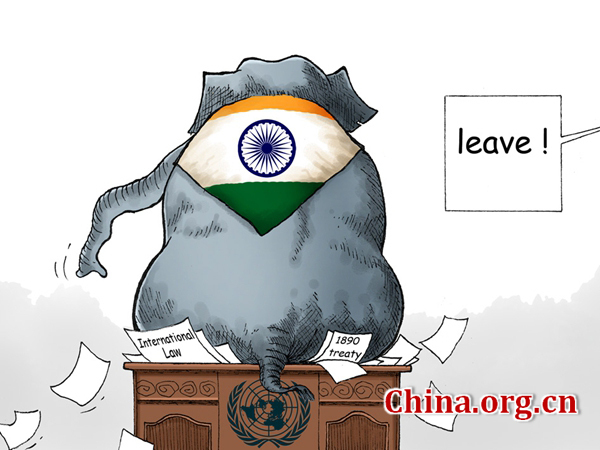Conflict with China doesn't help India
- By Aftab Hussain
 0 Comment(s)
0 Comment(s) Print
Print E-mail China.org.cn, August 21, 2017
E-mail China.org.cn, August 21, 2017
Prussian General and strategist Carl von Clausewitz, in his book "Vom Kriege," writes that "war is the continuation of policy by other means." This approach led the world into the two most devastating wars in recorded human history resulting in millions of deaths.
|
|
|
Instead of learning to live with its neighbors for the national good, India continues to cause trouble that will ultimately hurt its interests. [Photo by Zhai Haijun/China.org.cn] |
Later on, world leaders renounced this approach in order to prevent a repeat of such enormous destruction. However, some states are still pursuing this policy, believing in the display of power, creating conflicts and trying to assume supremacy wherever and whenever they can.
In South Asia, India has been one such state believing in war as a continuation of national policy. Since the very beginning, with Western encouragement, it has sought to play the role of regional policeman.
This has been evident from India's behavior in dealing with its smaller neighbors. If Pakistan had not acquired nuclear weapons, it also might have had to live under the Indian thumb just as Nepal, Bhutan and Bangladesh.
Its interference in the internal affairs of Bhutan, Sri Lanka, Nepal and Bangladesh are evident to all. The South Asian Association for Regional Cooperation (SAARC) has failed to deliver anything because of being overshadowed by India.
More recently, India has started another dangerous game, involving China. It's been more than two months since, despite Chinese warnings, India has shown itself too stubborn to move its troops from the Donglong (Doklam) region in the Himalayas.
The problem with the Indian military establishment is that it believes a display of power will surely enable it to overpower other countries in the region. However, Indian strategists have to update themselves on strategic developments around the world. With the advent of nuclear weapons, there can be no power struggle between nations anymore. Nuclear weapons have made the idea of strategic superiority obsolete. So, what objective is India pursuing?
In an historical context, before India invaded China in 1962, the bilateral relations between the two countries were most cordial and Beijing treated New Delhi as a reliable partner. Yet, India betrayed China and launched a war. It was the same with the German invasion of Russia in WWII despite there being a treaty of friendship between the two countries. In every case, the result was the aggressor receiving a humiliating defeat.
Despite many efforts to show India in the role of nice guy, issuing political statements about diplomatic solutions for local problems, an issue has been created by India obstructing China from constructing a road on its sovereign territory
There is no denying India is a big country. India's military might, population, geography and resources make it an important country in the region. However, strategic comparisons between India and China reveal the former is far behind in personnel, firepower and technology than China.
Also in terms of national power, there is huge gap between the two countries. Even Indians themselves think it inadvisable to provoke any conflict with China. India has been backed by the U.S. to try and create a tough time for China. However, such meddling can be a destructive for New Delhi.
It is common wisdom that you can change your friends but you cannot change your neighbors. As has been shown by every country before being part of any international development (just as India is a puppet in American hands as part of the conspiracy against China), one has to think of its own national interests.
The most important thing is to measure your own strength before engaging in any conflict. New Delhi needs to ask itself questions as: "What is in it for India in against China with American backing?" Will the U.S. tolerate India if it develops into a new China in the future? How long will [India] be able to save its own house if it ignites a fire in its neighbor's house?"
The U.S. is trying to maintain its global superiority by using countries such as India as proxies. In fact, the rise of China, the revival of Russia, the growth of Germany, South East Asian Nations and Latin America have already challenged American superiority; the world is no longer unipolar.
India has problems of its own such as poverty, underdevelopment, a huge illiterate population, titanic unemployment, environmental challenges, etc.
Instead of starting another conflict with China, India should pull out its troops out of the Donglong region and focus more on domestic development. Uneasy relations with neighboring countries are a hindrance to the wellbeing of Indian people. Such a display of stubbornness can only harm India's own national interests.
This is an age of geo-economics, when nations should be working more on looking for trade and investment opportunities with neighbors instead of conflicts. Indian establishment seriously needs to open its eyes to global developments and learn to live peacefully with its neighbors.
Aftab Hussain is a Pakistani research scholar of international relations based in Shanghai. He can be reached at aftabhussein@hotmail.com







Go to Forum >>0 Comment(s)